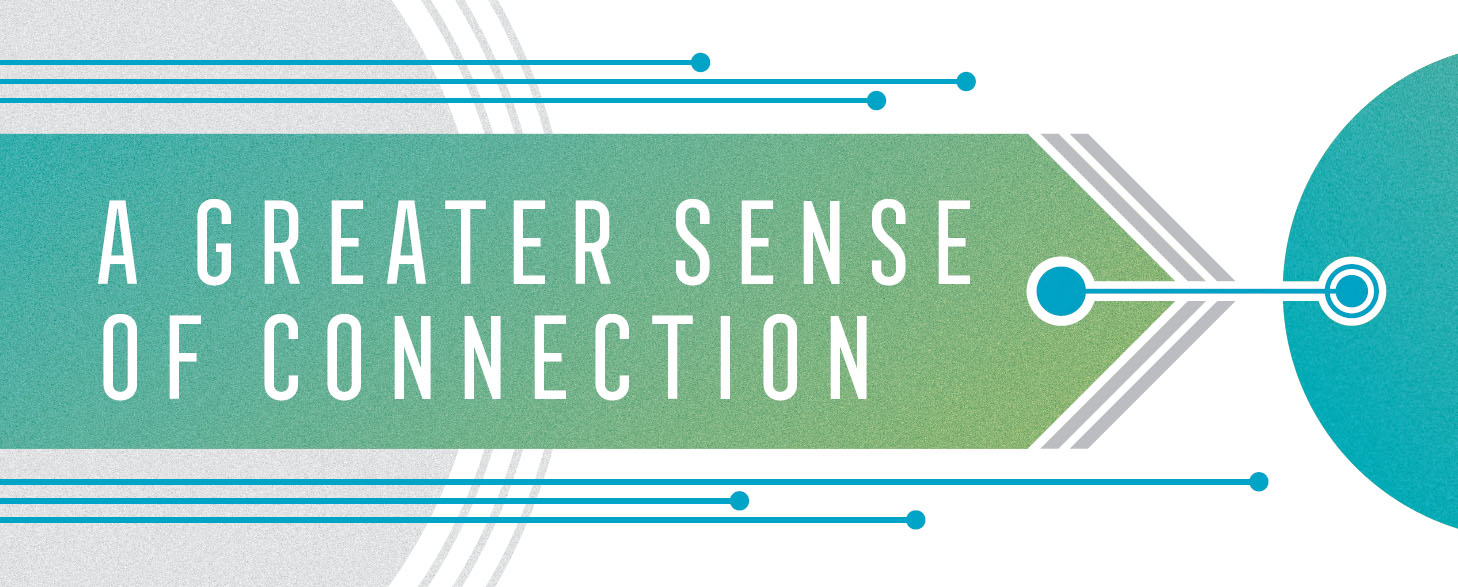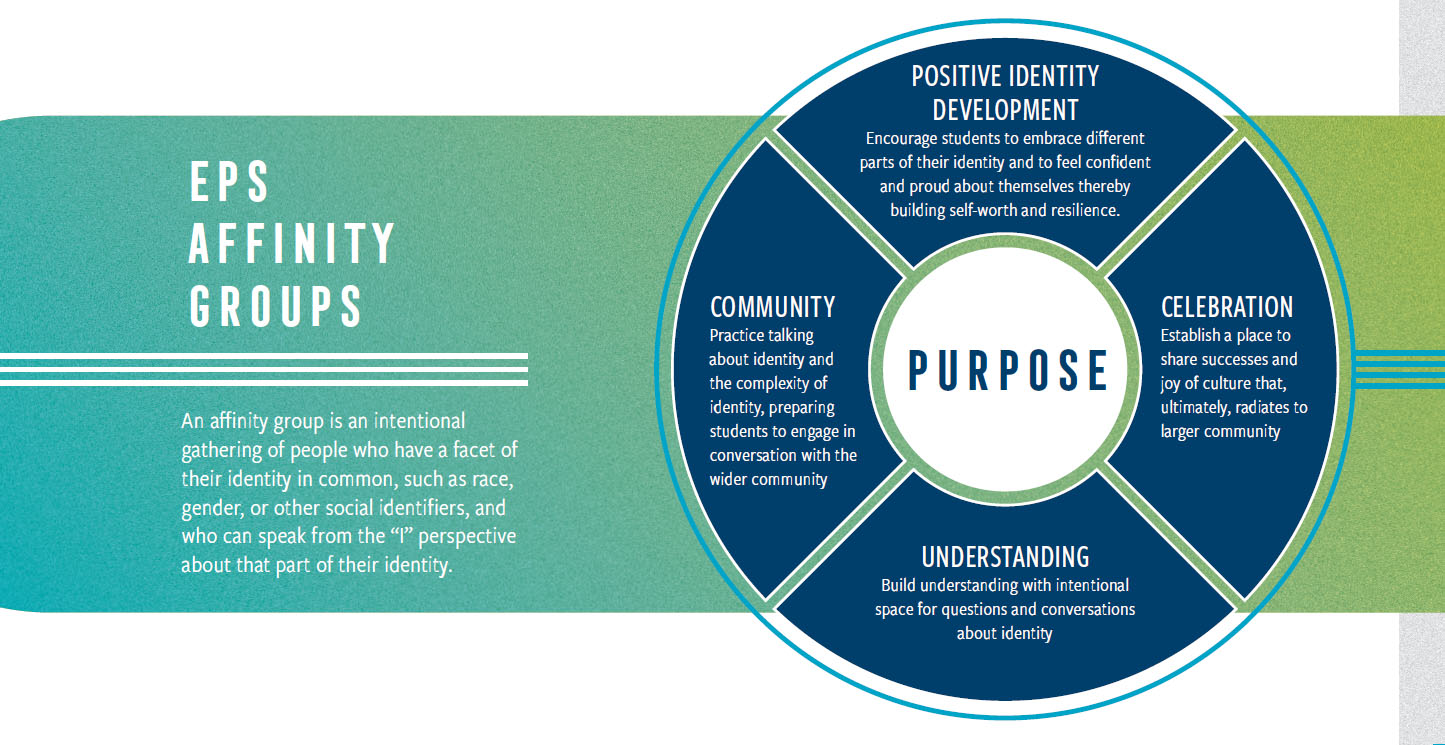
By Dr. Ed Castro and Bess McKinney, Equity, Inclusion, and Compassionate Leadership Co-Coordinators
Building a sense of connection and belonging is a continuous and ever-evolving process, requiring us to carve new paths and avenues. One such new path began in February in the Upper School and Middle School, when students first had an opportunity to gather in Eastside Prep’s own “affinity groups.” An affinity group is an intentional gathering of people who have a facet of their identity in common, such as race, gender, or other social identifiers, and who can speak from the “I” perspective about that part of their identity.
Affinity groups are not new—in some ways, they exist everywhere, all the time. But faculty-sponsored and facilitated conversations, designed to help students explore and build upon their positive self-identity, are unique. Affinity groups help all of us hear our own voices and feel a sense of belonging. They provide a space for building community, celebrating joy, and sharing successes and common challenges. They also allow a space for us to ask questions we might be afraid to ask otherwise. Having these spaces, students are then more prepared to engage in conversations about identity and complexity outside of their affinity groups with the whole community. Affinity groups thus build more compassion, more empathy, and, ultimately, a greater sense of connection.
As we started our journey into affinity spaces in February, some of these same singular points of connection revealed themselves during our conversations. Some of these conversations are about funny things we notice when we are caught in a transitional moment while code switching. In these cases, parents or guardians would gently remind us of who we are speaking to at the time. Both students and facilitators got a chuckle from that because age in that moment wasn’t a barrier. We all understood the same thing about family dynamics and respect with the generation that raised us. And there are times, even in the first few weeks of meetings, when we, as facilitators, are astonished at the depth of openness and sharing. As one facilitator noted: students were “remarkably articulate and supportive of one another. They shared challenging and uncomfortable experiences, and they also made time to share the richness of their family traditions and the rewards that come from” their perspectives. During some of our meetings, I would ask “How many of us have experienced that?” Hands would go up all around the room. I’d ask a follow-up question, “How many of us felt alone in that moment or thought this must be unique to me?” Hands still up. As we all look around the room to see the hands raised, there is a visual representation that we are not alone, that we are, in fact, connected. Affinity groups allow us to uncover and raise up those experiences, to feel less isolated, and more connected.
AFFINITY GROUPS HELP ALL OF US HEAR OUR OWN VOICES AND FEEL A SENSE OF BELONGING. THEY PROVIDE A SPACE FOR BUILDING COMMUNITY, CELEBRATING JOY, AND SHARING SUCCESSES AND COMMON CHALLENGES.
We know, both intuitively, anecdotally, and scientifically that the more teens feel connected, supported, and known by the teachers in their lives, the more they experience well-being (see Yu, et al. “She Calls me by My Last Name”: Exploring… Adolescent Perceptions of Positive Teacher-Student Relationships Journal of Adolescent Research). While affinity groups are primarily engines of connection between students, they are also spaces where students and EPS faculty and staff can connect about their own identities, as humans outside of the classroom. Being seen and known for who you are, not just as a student but as a person, is an essential part of helping students to feel connected to and supported at EPS. Affinity groups offer yet another way for this connection to occur.
 Affinity groups also allow us to know ourselves better. Perhaps one of the hardest things to do is self-reflection, especially if one is investigating their own identity. To further complicate this work, examining one’s identity is a multi-layered process. From the start the exploration might begin with “Who you are and know yourself to be,” next you might look at “How am I seen in the places I inhabit,” followed by a look, perhaps, at the connections one has with their closest peers. These are complicated questions and are not easily answerable. However, affinity groups offer a safe space in which to explore these questions. As trust is built within groups, more topics are examined and become clearer to students as they grapple with who they know themselves to be. The openness of affinity group conversations is a product of both comfort and affirmation; comfort in expressing ideas and thoughts in front of a group of people who have an understanding of your experience, and affirmation when one sees the nods and hears the sighs of compassion and empathy from other affinity group members. That compassion, empathy, and understanding lead to greater self-awareness, knowledge, and connection. As one EPS alumni said about, before experiencing an affinity group, “I hadn’t given myself time to think through my relationship with my identity or what it meant to me.” But then, in my first affinity group, I met someone and “hearing his story… really helped me along my path as well. It helped me think a little bit deeper about, okay, how I am connected to my identity and what does it mean to me. That was the first moment that I felt proud of it.”
Affinity groups also allow us to know ourselves better. Perhaps one of the hardest things to do is self-reflection, especially if one is investigating their own identity. To further complicate this work, examining one’s identity is a multi-layered process. From the start the exploration might begin with “Who you are and know yourself to be,” next you might look at “How am I seen in the places I inhabit,” followed by a look, perhaps, at the connections one has with their closest peers. These are complicated questions and are not easily answerable. However, affinity groups offer a safe space in which to explore these questions. As trust is built within groups, more topics are examined and become clearer to students as they grapple with who they know themselves to be. The openness of affinity group conversations is a product of both comfort and affirmation; comfort in expressing ideas and thoughts in front of a group of people who have an understanding of your experience, and affirmation when one sees the nods and hears the sighs of compassion and empathy from other affinity group members. That compassion, empathy, and understanding lead to greater self-awareness, knowledge, and connection. As one EPS alumni said about, before experiencing an affinity group, “I hadn’t given myself time to think through my relationship with my identity or what it meant to me.” But then, in my first affinity group, I met someone and “hearing his story… really helped me along my path as well. It helped me think a little bit deeper about, okay, how I am connected to my identity and what does it mean to me. That was the first moment that I felt proud of it.”
Knowing and understanding our own identities more fully helps us to, in turn, open up to and learn from others and the wider world. In the Middle School Young Men’s affinity space, they’ve already examined the stereotypes and consequent limitations that they associate with masculinity. Airing these limitations and talking about them not only helps us understand ourselves better, but also others in and outside of EPS. As some students have come back and told us about their affinity group experiences outside of EPS, once they experienced that support and space, they “hit the ground running;” they had strength to believe in themselves and confidence to reach out to others and create the change they want to see in the world.
Maya Angelou said, “I long, as does every human being, to be at home wherever I find myself.” Feeling at home requires that we feel connected—connected to ourselves and our identities, connected to those around us, and aware of and valuing our connection to the larger world. Even after the first few months of affinity groups, we can say confidently that these groups create spaces where those connections can happen and, where, we hope, more EPS students can feel at home.

